concept 概念的诸多释义
- 格式:docx
- 大小:37.53 KB
- 文档页数:6
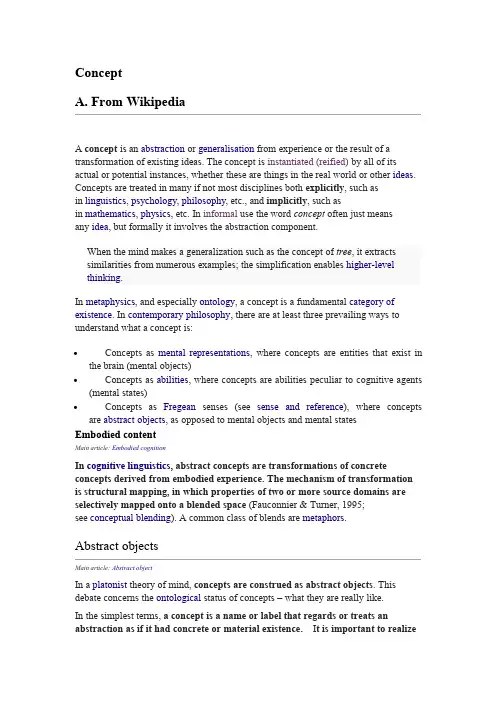
ConceptA.From WikipediaA concept is an abstraction or generalisation from experience or the result of a transformation of existing ideas.The concept is instantiated(reified)by all of its actual or potential instances,whether these are things in the real world or other ideas. Concepts are treated in many if not most disciplines both explicitly,such asin linguistics,psychology,philosophy,etc.,and implicitly,such asin mathematics,physics,etc.In informal use the word concept often just meansany idea,but formally it involves the abstraction component.When the mind makes a generalization such as the concept of tree,it extractssimilarities from numerous examples;the simplification enables higher-levelthinking.In metaphysics,and especially ontology,a concept is a fundamental category of existence.In contemporary philosophy,there are at least three prevailing ways to understand what a concept is:∙Concepts as mental representations,where concepts are entities that exist in the brain(mental objects)∙Concepts as abilities,where concepts are abilities peculiar to cognitive agents (mental states)∙Concepts as Fregean senses(see sense and reference),where concepts are abstract objects,as opposed to mental objects and mental states Embodied contentMain article:Embodied cognitionIn cognitive linguistics,abstract concepts are transformations of concrete concepts derived from embodied experience.The mechanism of transformation is structural mapping,in which properties of two or more source domains are selectively mapped onto a blended space(Fauconnier&Turner,1995;see conceptual blending).A common class of blends are metaphors.Abstract objectsMain article:Abstract objectIn a platonist theory of mind,concepts are construed as abstract objects.This debate concerns the ontological status of concepts–what they are really like.In the simplest terms,a concept is a name or label that regards or treats an abstraction as if it had concrete or material existence.I t is important to realizethat a concept is merely a symbol,a representation of the abstraction.The word is not to be mistaken for the thing.For example,the word"moon"(a concept)is not the large,bright,shape-changing object up in the sky,but only represents that celestial object.Concepts are created(named)to describe,explain and capture reality as it is known and understood.A priori conceptsMain articles:A priori and a posteriori and Category(Kant)Kant declared that human minds possess pure or a priori concepts.Instead of being abstracted from individual perceptions,like empirical concepts,they originate in the mind itself.He called these concepts categories,in the sense of the word that means predicate,attribute,characteristic,or quality.But these pure categories are predicates of things in general,not of a particular thing.He called those concepts that result from abstraction"a posteriori concepts"(meaning concepts that arise out of experience).An empirical or an a posteriori concept is a general representation (Vorstellung)or non-specific thought of that which is common to several specific perceived objects(Logic,I,1.,§1,Note1)A concept is a common feature or characteristic.Kant investigated the way that empirical a posteriori concepts are created.The logical acts of the understanding by which concepts are generatedas to their form are:parison,i.e.,the likening of mental images to one another inrelation to the unity of consciousness;2.reflection,i.e.,the going back over different mental images,howthey can be comprehended in one consciousness;and finally3.abstraction or the segregation of everything else by which themental images differ...In order to make our mental images into concepts,onemust thus be able to compare,reflect,and abstract,forthese three logical operations of the understanding areessential and general conditions of generating anyconcept whatever.OntologyMain article:OntologyPlato was the starkest proponent of the realist thesis of universal concepts.By his view,concepts(and ideas in general)are innate ideas that were instantiations of a transcendental world of pure forms that lay behind the veil of the physical world.In this way,universals were explained as transcendent objects.Main article:Mental representationIn a physicalist theory of mind,a concept is a mental representation,which the brain uses to denote a class of things in the world.This is to say that it is literally,a symbol or group of symbols together made from the physical material of the brain. Concepts are mental representations that allow us to draw appropriate inferences about the type of entities we encounter in our everyday lives.Concepts do not encompass all mental representations,but are merely a subset of them.The use of concepts is necessary to cognitive processes suchas categorization,memory,decision making,learning,and inference.Classical theoryMain article:DefinitionismThe classical theory of concepts,also referred to as the empiricist theory of concepts, is the oldest theory about the structure of concepts(it can be traced back to Aristotle), and was prominently held until the1970s.The classical theory of concepts says that concepts have a definitional structure.Adequate definitions of the kind required by this theory usually take the form of a list of features.These features must have two important qualities to provide a comprehensive definition.Features entailed by the definition of a concept must be both necessary and sufficient for membership in the class of things covered by a particular concept.A feature is considered necessary if every member of the denoted class has that feature.A feature is considered sufficient if something has all the parts required by the definition.Another key part of this theory is that it obeys the law of the excluded middle,which means that there are no partial members of a class,you are either in or out.Prototype theoryMain article:Prototype theoryPrototype theory says that concepts specify properties that members of a class tend to possess,rather than must possess.Wittgenstein describes the relationship between members of a class as family resemblances.There are not necessarily any necessary conditions for membership,a dog can still be a dog with only three legs. This view is particularly supported by psychological experimental evidence for prototypicality effects.We can judge an item's membership to the referent class of a concept by comparing it to the typical member–the most central member of the concept.If it is similar enough in the relevant ways,it will be cognitively admitted as a member of the relevant class of entities.Rosch suggests that every category is represented by a central exemplar which embodies all or the maximum possible number of features of a given category.Theory-theoryThis theory postulates that categorization by concepts is something like scientific theorizing.Concepts are not learned in isolation,but rather are learned as a part of ourexperiences with the world around us.In this sense,concepts'structure relies on their relationships to other concepts as mandated by a particular mental theory about the state of the world.According to the theory of ideasthesia(or"sensing concepts"),activation of a concept may be the main mechanism responsible for creation of phenomenal experiences.Therefore,understanding how the brain processes concepts may be central to solving the mystery of how conscious experiences(or qualia)emerge within a physical system e.g.,the sourness of the sour taste of lemon.This question is also known as the hard problem of consciousness.Research on ideasthesia emerged from research on synesthesia where it was noted that a synesthetic experience requires first an activation of a concept of the ter research expanded these results into everyday perception.B.From Sci-tech encyclopediaConcept1.International Dictionary of Psychoanalysis|2005|Luzes,PedroCOPYRIGHT2005Thomson Gale.For Wilfred Bion,conception is the result of coupling a pre-conception,an innate a priori idea,and a realization,elements of the real that are provided by external-sensory or internal-emotional experience.The concept is derived from conception through abstraction and nguage and the attribution of a name to a concept unite preconception and realization,preventing any loss of experience in the process.Bion considers the concept a conception that has been assigned a name.The concept signifies a growth of the abstraction that enables us to expand the generalization of psychoanalytic theories,which,as a whole are judged to be too descriptive,too concrete.Concepts can be articulated in a deductive scientific system that functions like an Ars combinatoria2.The Oxford Pocket Dictionary of Current English|2009©The Oxford Pocket Dictionary of Current English2009,originally published by Oxford University Press2009.con·cept/ˈkänˌsept/•n.an abstract idea;a general notion:the concept of justice.∎a plan or intention;a conception:the center has kept firmly to its originalconcept.∎an idea or invention to help sell or publicize a commodity:a new concept in corporate hospitality.∎Philos.an idea or mental picture of a group or class of objects formed by combining all their aspects.∎[as adj.](of a car or other vehicle) produced as an experimental model to test the viability of new design features.C.British Dictionary definitions for conceptnoun1.an idea,esp an abstract idea:the concepts of biology2.(philosophy)a general idea or notion that corresponds to some class of entities andthat consists of the characteristic or essential features of the class3.(philosophy)a.the conjunction of all the characteristic features of somethingb.a theoretical construct within some theoryc.a directly intuited object of thoughtd.the meaning of a predicate4.(modifier)(of a product,esp a car)created as an exercise to demonstrate thetechnical skills and imagination of the designers,and not intended for massproduction or saleWord Origin and History for conceptn.1550s,from Medieval Latin conceptum"draft,abstract,"in classical Latin"(a thing) conceived,"from concep-,past participle stem of concipere"to take in"(see conceive).In some16c.cases a refashioning of conceit(perhaps to avoidnegative connotations).D.From Britannica encylopedia1.concept,in the Analytic school of philosophy,the subject matter of philosophy,which philosophers of the Analytic school hold to be concerned with the salientfeatures of the language in which people speak of concepts at issue.Concepts are thus logical,not mental,entities.A typical instance of the use of concept is in The Concept of Mind(1949)by Gilbert Ryle,an Oxford Analyst,which implies that the purpose of the author is not to investigate matters of fact empirically(i.e.,by themethods of psychology)about the mind itself but to investigate its“logicalgeography.”Similarly,investigation...(100of138words)DictionarytheA semanticallyF.From Collins English Dictionarynoun1.an idea,esp an abstract idea⇒the concepts of biology2.philosophy a general idea or notion that corresponds to some class of entities and that consists of the characteristic oressential features of the class3.philosophy a.the conjunction of all the characteristic features of somethingb.a theoretical construct within some theoryc.a directly intuited object of thoughtd.the meaning of a predicate4.(modifier)(of a product,esp a car)created as an exercise to demonstrate the technical skills and imagination of thedesigners,and not intended for mass production or sale.。
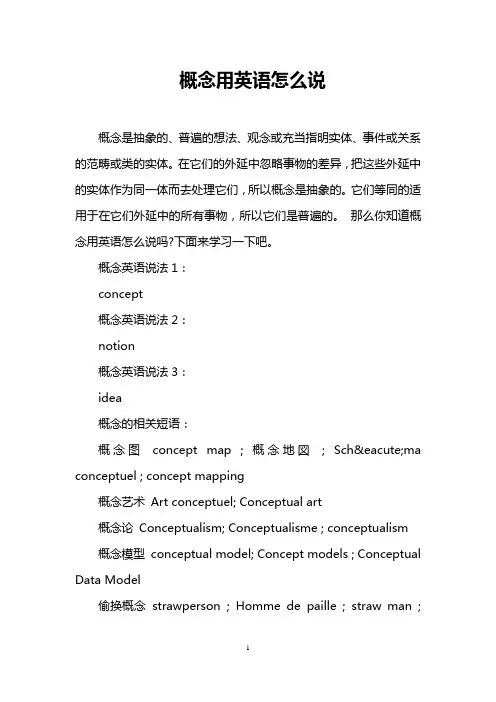
概念用英语怎么说概念是抽象的、普遍的想法、观念或充当指明实体、事件或关系的范畴或类的实体。
在它们的外延中忽略事物的差异,把这些外延中的实体作为同一体而去处理它们,所以概念是抽象的。
它们等同的适用于在它们外延中的所有事物,所以它们是普遍的。
那么你知道概念用英语怎么说吗?下面来学习一下吧。
概念英语说法1:concept概念英语说法2:notion概念英语说法3:idea概念的相关短语:概念图concept map ; 概念地図; Schéma conceptuel ; concept mapping概念艺术Art conceptuel; Conceptual art概念论Conceptualism; Conceptualisme ; conceptualism概念模型conceptual model; Concept models ; Conceptual Data Model偷换概念strawperson ; Homme de paille ; straw man ;different concepts自我概念self concept ; concept ; self-conception ; concept of the self概念模式conceptual schema ; conceptual model ; conceptual level ; concept model概念结构conceptual structure ; concept structure ; conceptual framework ; central conceptual structure 设计概念design concept ; Concept Diagram ; Concept ; design conception概念的英语例句:1. The functionalist model of industrial society was subjected to conceptual criticism.工业社会的实用主义模型在概念上遭到了批判。
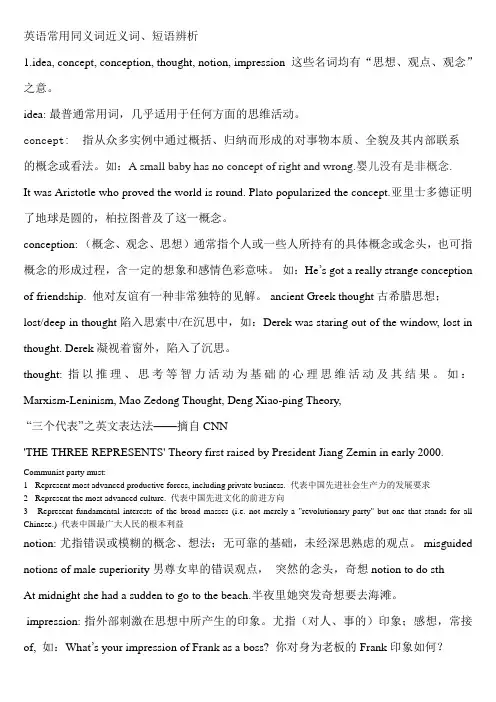
英语常用同义词近义词、短语辨析1.idea, concept, conception, thought, notion, impression 这些名词均有“思想、观点、观念”之意。
idea: 最普通常用词,几乎适用于任何方面的思维活动。
concept: 指从众多实例中通过概括、归纳而形成的对事物本质、全貌及其内部联系的概念或看法。
如:A small baby has no concept of right and wrong.婴儿没有是非概念.It was Aristotle who proved the world is round. Plato popularized the concept.亚里士多德证明了地球是圆的,柏拉图普及了这一概念。
conception: (概念、观念、思想)通常指个人或一些人所持有的具体概念或念头,也可指概念的形成过程,含一定的想象和感情色彩意味。
如:He’s got a really strange conception of friendship. 他对友谊有一种非常独特的见解。
ancient Greek thought古希腊思想;lost/deep in thought陷入思索中/在沉思中,如:Derek was staring out of the window, lost in thought. Derek凝视着窗外,陷入了沉思。
thought: 指以推理、思考等智力活动为基础的心理思维活动及其结果。
如:Marxism-Leninism, Mao Zedong Thought, Deng Xiao-ping Theory,“三个代表”之英文表达法——摘自CNN'THE THREE REPRESENTS' Theory first raised by President Jiang Zemin in early 2000.Communist party must:1 - Represent most advanced productive forces, including private business. 代表中国先进社会生产力的发展要求2 - Represent the most advanced culture. 代表中国先进文化的前进方向3 - Represent fundamental interests of the broad masses (i.e. not merely a "revolutionary party" but one that stands for all Chinese.) 代表中国最广大人民的根本利益notion: 尤指错误或模糊的概念、想法;无可靠的基础,未经深思熟虑的观点。
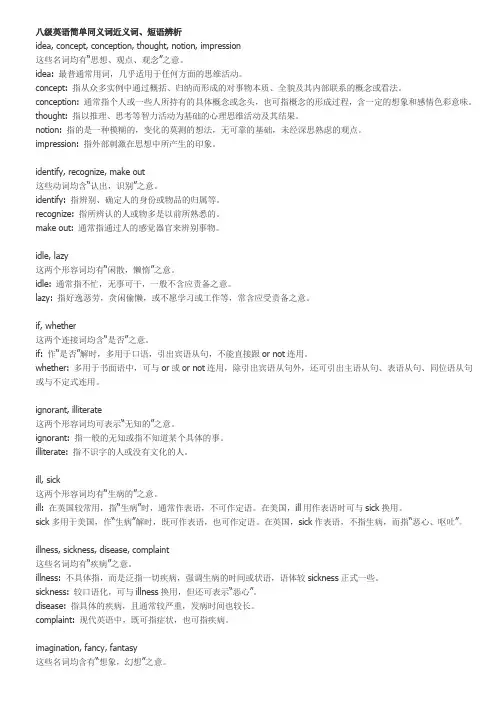
八级英语简单同义词近义词、短语辨析idea, concept, conception, thought, notion, impression这些名词均有“思想、观点、观念”之意。
idea: 最普通常用词,几乎适用于任何方面的思维活动。
concept: 指从众多实例中通过概括、归纳而形成的对事物本质、全貌及其内部联系的概念或看法。
conception: 通常指个人或一些人所持有的具体概念或念头,也可指概念的形成过程,含一定的想象和感情色彩意味。
thought: 指以推理、思考等智力活动为基础的心理思维活动及其结果。
notion: 指的是一种模糊的,变化的莫测的想法,无可靠的基础,未经深思熟虑的观点。
impression: 指外部刺激在思想中所产生的印象。
identify, recognize, make out这些动词均含“认出,识别”之意。
identify: 指辨别、确定人的身份或物品的归属等。
recognize: 指所辨认的人或物多是以前所熟悉的。
make out: 通常指通过人的感觉器官来辨别事物。
idle, lazy这两个形容词均有“闲散,懒惰”之意。
idle: 通常指不忙,无事可干,一般不含应责备之意。
lazy: 指好逸恶劳,贪闲偷懒,或不愿学习或工作等,常含应受责备之意。
if, whether这两个连接词均含“是否”之意。
if: 作“是否”解时,多用于口语,引出宾语从句,不能直接跟or not连用。
whether: 多用于书面语中,可与or或or not连用,除引出宾语从句外,还可引出主语从句、表语从句、同位语从句或与不定式连用。
ignorant, illiterate这两个形容词均可表示“无知的”之意。
ignorant: 指一般的无知或指不知道某个具体的事。
illiterate: 指不识字的人或没有文化的人。
ill, sick这两个形容词均有“生病的”之意。
ill: 在英国较常用,指“生病”时,通常作表语,不可作定语。
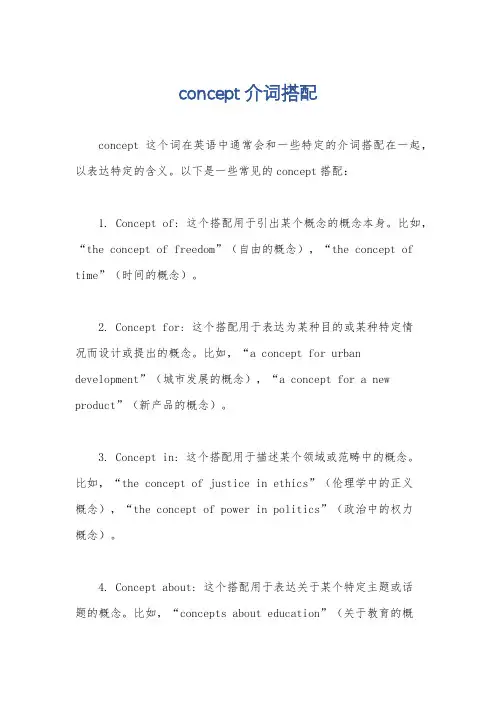
concept介词搭配
concept这个词在英语中通常会和一些特定的介词搭配在一起,以表达特定的含义。
以下是一些常见的concept搭配:
1. Concept of: 这个搭配用于引出某个概念的概念本身。
比如,“the concept of freedom”(自由的概念),“the concept of time”(时间的概念)。
2. Concept for: 这个搭配用于表达为某种目的或某种特定情
况而设计或提出的概念。
比如,“a concept for urban development”(城市发展的概念),“a concept for a new product”(新产品的概念)。
3. Concept in: 这个搭配用于描述某个领域或范畴中的概念。
比如,“the concept of justice in ethics”(伦理学中的正义
概念),“the concept of power in politics”(政治中的权力
概念)。
4. Concept about: 这个搭配用于表达关于某个特定主题或话
题的概念。
比如,“concepts about education”(关于教育的概
念),“concepts about love and relationships”(关于爱和人际关系的概念)。
这些是一些常见的concept搭配,它们可以帮助我们更准确地表达和理解各种概念。
希望这些解释能够帮到你。
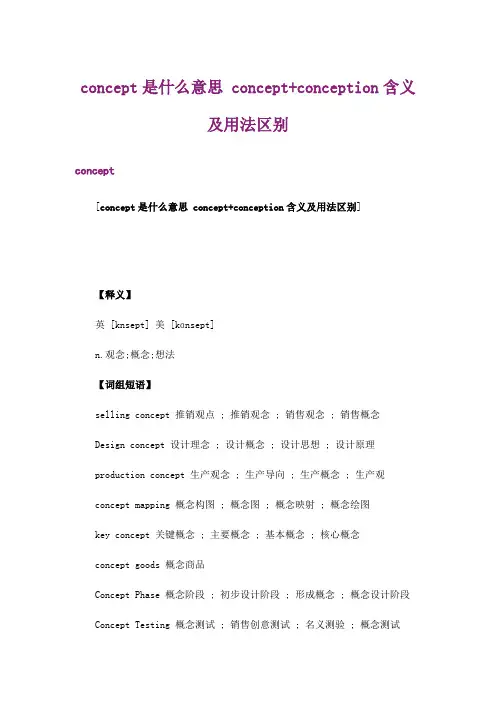
concept是什么意思 concept+conception含义
及用法区别
concept
[concept是什么意思 concept+conception含义及用法区别]
【释义】
英 [knsept] 美 [kɑnsept]
n.观念;概念;想法
【词组短语】
selling concept 推销观点 ; 推销观念 ; 销售观念 ; 销售概念
Design concept 设计理念 ; 设计概念 ; 设计思想 ; 设计原理
production concept 生产观念 ; 生产导向 ; 生产概念 ; 生产观
concept mapping 概念构图 ; 概念图 ; 概念映射 ; 概念绘图
key concept 关键概念 ; 主要概念 ; 基本概念 ; 核心概念
concept goods 概念商品
Concept Phase 概念阶段 ; 初步设计阶段 ; 形成概念 ; 概念设计阶段Concept Testing 概念测试 ; 销售创意测试 ; 名义测验 ; 概念测试
Concept Store 概念店 ; 并积极发展 ; 品牌观点店 ; 概念店
【词义辨析】
1. idea,concept,conception,thought,notion,impression
这些名词均有“思想、观点、观念”之意。
idea最普通常用词,几乎适用于任何方面的思维活动。
concept指从众多实例中通过概括、归纳而形成的对事物本质、全貌及其内部联系的概念或看法。
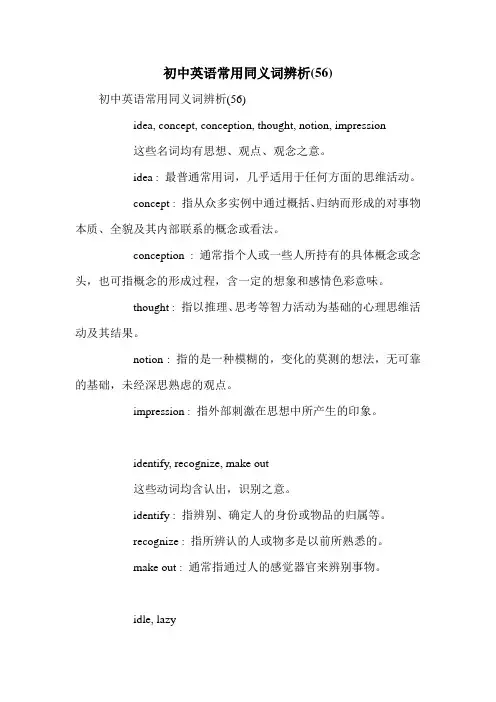
初中英语常用同义词辨析(56)初中英语常用同义词辨析(56)idea, concept, conception, thought, notion, impression这些名词均有思想、观点、观念之意。
idea : 最普通常用词,几乎适用于任何方面的思维活动。
concept : 指从众多实例中通过概括、归纳而形成的对事物本质、全貌及其内部联系的概念或看法。
conception : 通常指个人或一些人所持有的具体概念或念头,也可指概念的形成过程,含一定的想象和感情色彩意味。
thought : 指以推理、思考等智力活动为基础的心理思维活动及其结果。
notion : 指的是一种模糊的,变化的莫测的想法,无可靠的基础,未经深思熟虑的观点。
impression : 指外部刺激在思想中所产生的印象。
identify, recognize, make out这些动词均含认出,识别之意。
identify : 指辨别、确定人的身份或物品的归属等。
recognize : 指所辨认的人或物多是以前所熟悉的。
make out : 通常指通过人的感觉器官来辨别事物。
idle, lazy这两个形容词均有闲散,懒惰之意。
idle : 通常指不忙,无事可干,一般不含应责备之意。
lazy : 指好逸恶劳,贪闲偷懒,或不愿学习或工作等,常含应受责备之意。
if, whether这两个连接词均含是否之意。
if : 作是否解时,多用于口语,引出宾语从句,不能直接跟or not连用。
whether : 多用于书面语中,可与or或or not连用,除引出宾语从句外,还可引出主语从句、表语从句、同位语从句或与不定式连用。
ignorant, illiterate这两个形容词均可表示无知的之意。
ignorant : 指一般的无知或指不知道某个具体的事。
illiterate : 指不识字的人或没有文化的人。
ill, sick这两个形容词均有生病的之意。
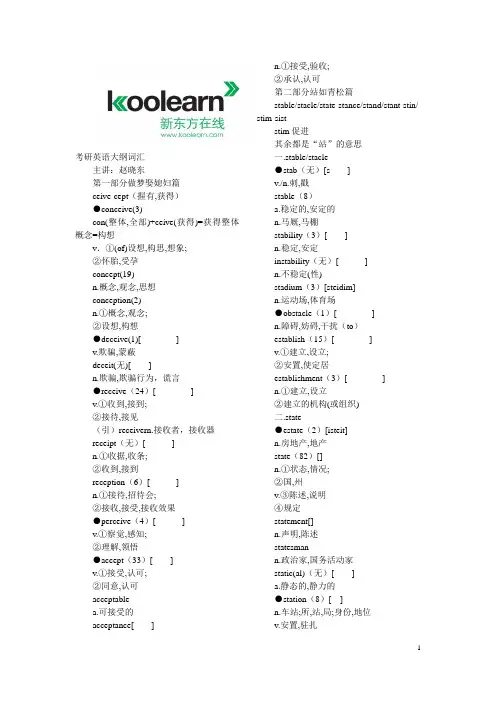
考研英语大纲词汇主讲:赵晓东第一部分做梦娶媳妇篇ceive-cept(握有,获得)●conceive(3)con(整体,全部)+ceive(获得)=获得整体概念=构想v.①(of)设想,构思,想象;②怀胎,受孕concept(19)n.概念,观念,思想conception(2)n.①概念,观念;②设想,构想●deceive(1)[ ]v.欺骗,蒙蔽deceit(无)[ ]n.欺骗,欺骗行为,谎言●receive(24)[ ]v.①收到,接到;②接待,接见(引)receivern.接收者,接收器receipt(无)[ ]n.①收据,收条;②收到,接到reception(6)[ ]n.①接待,招待会;②接收,接受,接收效果●perceive(4)[ ]v.①察觉,感知;②理解,领悟●accept(33)[ ]v.①接受,认可;②同意,认可acceptablea.可接受的acceptance[ ]n.①接受,验收;②承认,认可第二部分站如青松篇stable/stacle/state-stance/stand/stant-stin/ stim-siststim促进其余都是“站”的意思一.stable/stacle●stab(无)[s ]v./n.刺,戳stable(8)a.稳定的,安定的n.马厩,马棚stability(3)[ ]n.稳定,安定instability(无)[ ]n.不稳定(性)stadium(3)[steidim]n.运动场,体育场●obstacle(1)[ ]n.障碍,妨碍,干扰(to)establish(15)[ ]v.①建立,设立;②安置,使定居establishment(3)[ ]n.①建立,设立②建立的机构(或组织)二.state●estate(2)[isteit]n.房地产,地产state(82)[]n.①状态,情况;②国,州v.③陈述,说明④规定statement[]n.声明,陈述statesmann.政治家,国务活动家static(al)(无)[ ]a.静态的,静力的●station(8)[ ]n.车站;所,站,局;身份,地位v.安置,驻扎stationary(2)[ ]a.静止的,固定的stationery(无)[ ]n.文具●statistical(3)[ ]a.统计的,统计学的statistics(10)[ ]n.统计(学)注:-ics学科statue(无)[ ]n.塑像,雕像statute(无)[ ]n.法规,章程,规则status(17)[]n.①地位,身份;②情形,状况三.stance/stand/stant●circumstance(9)[ ] n.①[pl.]情况,形势,环境;②经济情形,境况instance(7)[]n.例子,事例,例证instant(4)[]a.①立即的,直接的;②紧迫的;③(食品)速溶的,方便的n.瞬间,时刻instantaneous(1)[ ]a.瞬间的,即刻的instantly(2)[ ]ad.立即,即刻●substance(26)[ ]n.①物质,实质;②财产,财物③大意;substantial(8次)[ ]a.①实质的,真实的;②坚固的,结实的;③富裕的stand[ ]v.①站,站立;②坐落,位于;③坚持,维持原状;④经受,忍受n.台,座standard(29)[ ]n.标准,规则a.标准的standardize(3)[ ] v.使符合标准,使标准化●constant(9次)[ ]a.①经常的,不断的;②坚定的,永恒的③忠实的standpoint(无)[ ] n.立场,观点distance(11)[ ]n.距离,间隔,远方,路程distant(7)[ ]a.远的,久远的四.stim/stin篇●stimulate(4次)[ ]v.①刺激,使兴奋;②激励,鼓舞sting(无)[ ]v./n.①刺,刺痛,剧痛;②刺,叮stir(2)[ ]v.①搅拌,搅动;②摇动;③激动;④轰动;⑤煽动,鼓动stirup激起,鼓动,煽动stitch(无)[ ]n.一针,针脚v.缝,缝合●obstinate(无)[ ]a.顽固的,固执的distinct(14)[ ]a.①清楚的,明显的;②(from)截然不同的distinction[ ]n.差别,区分distinguish(10)[ ] v.①(from)区别,辨别;②辨认出;③使杰出五.sist篇●exist(37)[ ]v.存在;生活existence[ ]n.①存在,实在;②生存,生活(方式)existent[ ]a.存在的nonexistent不存在的●assist(18)[]v.帮助,援助,协助assistance[]n.帮助,援助assistant[ ]n.助手,助教a.辅助的,助理的●consist(7次)[ ]v.(in)在于,存在于;(of)由…组成,由...构成consistent(7)[ ]a.①(with)前后一致的②始终如一的●insist(9)[]v.(on)坚持要求,坚持(强调坚决主张)persist(5)[ ]v.(in)坚持,持续(强调一种精神)●resist(3)[ ]v.①抵抗,反抗;②抗,忍得住,抵制resistance(2)[ ]n.①(to)抵抗,反抗;②抵抗力,阻力;③电阻resistant(3次)[ ]a.(to)抵抗的,有抵抗力的第三部分飞刀切菜篇cad/case/cide-cise/cide-pend/pense-set/stall/pose-press-here落-切-悬-放-压-粘一.cad/case篇decade(23)[ ]n.十年dec十decimal十进(制)的decay(无)[ ]v./n.①腐朽,腐烂;②衰减,衰退case(35)[ ]n.①箱,盒,容器;②情况,事实;③病例;④案件cashier(无)[ ]n.收银员,出纳员cash(14)[ ]n.现金,现款v.兑现,付(或收)现款casual(6)[ ]a.①偶然的,碰巧的;②临时的,非正式的casualty(1)[ ] n.①伤亡人员;②受害人occasion(3)[ ]n.①场合,时节,时刻;②时机,机会occasional(5)[ ]a.①偶然的,非经常的,特殊场合的;②临时的;③不时的二.cide/cise篇●decide(16)[ ]v.①决定,下决心;②解决,裁决decided(5)[ ]a.①决定了的的,坚决的;②明显的,明确的decision(24)[ ]n.①决定,决心;②决议;决策decisive(2)[ ]a.①决定性的;②明确的;③果断的;determine(25)[ ]v.①决心,决定;(强调坚忍不拔)②确定,限定●precise(9)[ ]a.精确的,准确的precision(2)[ ]n.精确,精确度concise(2)[ ]a.简明的,简洁的●suicide(10)[ ]n.自杀,自取灭亡accident(14)[ ]n.①事故;②意外的事,偶然的事accidental(1)[ ] a.偶然的,意外的―lyadv.incidence(1)[ ]n.发生(率)incident(8)[ ]n.事件,事变incidentally(1)[ ] ad.附带地,顺便提及coincide(无)[ ] v.和...一致,相符,相同coincidence(2)[ ]n.①巧合,巧事;②一致,符合三.pend/pense篇●depend(23)[ ]v.①(on/upon)取决于,依靠②信赖,相信dependence(4)[ ]n.(on)依靠;依赖;信赖dependent(6)[ ]a.①依靠的,依赖的②从属的;随...而定的independence(5)[ ] n.独立,自主in相反independent(15)[ ]a.(of)独立的,自主的in相反indispensable(3)[ ] a.(to,for)必不可少的,必需的in相反●suspend(3)[ ]v.①吊,悬挂;②推迟,暂停suspense(无)[ ]n.悬而未决,不确定suspensible(无)[ ] a.可吊的,可悬浮的,可悬挂的appendix(无)[ ] n.附录,附属物四.set/stall●set[]n.①(一)套,(一)副,(一)批;②机组,接收机v.①放,安置;②树立,创造;③调正,校正;④落山,下沉a.不变的,固定的,规定的setting(3)[ ]n.①安置,安装;②落山;③(固定东西的)柜架底座;④环境,背景settle(12)[ ]v.①安定,安顿;②停息;③定居;④解决,调停settlement(4)[ ]n.①解决,决定,调停;②居留区,住宅区●stall(1)[ ]n.①货摊;②畜栏,厩v.(使)停转,(使)停止install/instal(3)[ ] v.安装,设置installation(无)[ ] n.①安装,设置;②装置,设备installment(无)[ ] n.①分期付款;②就任,就职五.pose●dose(1)[ ]n.剂量,一服,一剂v.(给...)服药pose[ ]v.①造成(困难等);②提出(问题等),陈述(观点等);③摆姿势;④假装,冒充position(10)[ ]n.①位置;②职位,职务;③姿势,姿态;④见解,立场,形势positive(8)[ ]a.①确实的,明确的;②积极的,肯定的;③正的,阳性的;④十足的,完全的n.(摄影)正片●impose(6)[ ]v.①征(税);②(on)把...强加给expose(8)[ ]v.①(to)使暴露,受到;②使曝光exposure(1)[ ]n.①暴露,揭露;②(to)受到disposal(无)[ ]n.①处理,处置;②布置,安排dispose(2)[ ]v.①(of)处理,处置;②(for)布置,安排deposit(2)[ ]v.①存放;②储蓄;③使沉淀;④付(保证金)n.①存款,保证金;②沉积物deposition(无)[ , ] n.沉积作用,沉积物oppose(7)[ ]v.反对,反抗opposite(9)[ ]a.(to)对面的,对立的,相反的n.对立面,对立物prep.在...的对面●symposium(2)[ , ] n.①讨论会,专题报告会;②专题论文集decompose(无)[ ] v.分解compose(5)[ ]v.①组成,构成;②(of)由...组成;③创作(作曲,诗歌等)composition(15)[ ]n.①作品,作文,乐曲;②写作,作曲;③结构,组成,成分preposition(无)[ ] n.介词purpose(26)[ ]n.①目的,意图;②用途,效果proposal(2)[ ]n.①提议,建议;②求婚propose(5)[ ]v.①提议,建议;②提名,推荐;③求婚proposition(3)[ ] n.①主张,建议;②陈述,命题suppose(7)[ ]v.①料想,猜想;②假定,以为;③[用于祈使语句]让,没六.press篇●press[ ]v.①压,揿,按;②压榨,压迫;③紧迫,催促,逼迫n.①报刊,出版社,通讯社;②压榨机,压力机;③压,揿,按pressure(10)[ ] n.①压(力);②强制,压迫,压强impress(4)[ ]v.①(on)印,盖印;②留下印象,引人注目n.印记impression(4)[ ]n.①印象,感想;②盖印,压痕impressive(1)[ ]给人深刻印象的,感人的express(32)[ ]v.表达,表示a.特快的,快速的n.快车,快运expression[ ]n.①表达,表示;②词句,措词;③式,符号●depress(9)[ ]v.①压抑,降低;②使沮丧,压下oppress(1)[ ]v.压迫,压制suppress(1)[ ]v.①镇压,压制;②抑制,忍住;③查禁compress(1)[ ]v.压缩,浓缩●pessimistic(1)[ ]a.悲观(主义)的optimistic(8)[ ] a.乐观主义的optimize(无)[ ]v.使优化七.here篇●coherent(无)[ ]a.粘着的,粘附的inherent(2)[ ]a.固有的,内在的,天生的inherit(无)[ ]v.继承adhere(无)[ ]v.①(to)粘附,胶着;②坚持heritage(1)[ ]n.①遗产,继承物;②传统●her[ ]pron.[she的宾格]她;[she的所有格]她的herd(无)[ ]n.群,兽群,牛群v.放牧,群集here[ ]ad.①这里,在这里;②从这里,到这里;③在这一点上,这时hero(5)[ ]n.①英雄,勇士;②男主角,男主人公heroine(无)[ ]n.①女英雄;②女主角heroin(3)[ ]n.海洛因heroic(无)[ ]a.英雄的,英勇的●hers[ ]pron.[she的物主代词]她的(东西) herself[ ]pron.她自己,她亲自,她本人hesitate(4)[ ]v.①犹豫,踌躇;②含糊,支吾hesitation(无)[ ]n.犹豫,踌躇hijack/highjack(无)[ ] v.劫持highjack(无)[` ] v.抢劫,劫持,揩油第四部分女子十二乐坊篇feas/feat/fect-fic/fac/fact-ag/act/oper-feit/fit/labor做一.feas/feat●feasible(无)[ ]a.可行的feast(无)[ ]n.①节日;②宴会feather(无)[ ]n.羽毛feature(9)[ ]n.①特征,特色;②特写二.feat/fect/fic●defeat(5)[ ]v./n.战胜,挫败n.失败defect(2)[ ]n.缺点,缺陷deficiency(1)[ ]n.①缺乏,不足;②缺陷deficit(无)[ ]n.赤字,逆差●efficiency(10)[ ]n.①效率;②功效efficient(10)[ ]a.①有效的,效率高的;(in-)②有能力的,能胜任的sufficient(14)[ ]a.(for)足够的,充分的insufficient(3)[ ]a.(for,of)不足的,不够的proficiency(2)[ ] n.(in)熟练,精通●effect(66)[ ]n.①(on)作用,影响;②结果;③效果,效力v.产生,招致effective[ ]a.有效的,生效的affect(19)[ ]v.①影响;②感动affection(1)[ ]n.①爱,慈爱,感情;②影响●perfect(5)[ ]a.①完善的,无瑕的;②完全的,十足的;③[语法]完成的v.使完美,改进perfection(无)[ ]n.尽善尽美,完美perfectly(1)[ ] ad.很,完全●superficial(3)[ ]a.①表面的;②肤浅的,浅薄的artificial(7)[ ]a.①人工的,人造的;②人为的,娇揉造作的office(26)[ ]n.①办公室,办事处;②职务,公职;③部,局,处officer(4)[ ]n.①官员,办事员;②工作人员;③军官official(11)[ ]n.官员,行政官员a.①官方的,官方的,②正式的,公务的三.fac/fact-ag篇●faculty(2)[ ]n.①才能;②学院,系;③(学院或系的)全体教学人员facility(无)[ ]n.①灵巧,熟练;②[pl.]]设备,设施,便利条件facilitate(1)[ ]v.使变得(更)容易,使便利●factor(15)[ ]n.因素,要素factory[ ]n.工厂fact(50)[ ]n.事实,实际exaggerate(2)[ ] v.夸大,夸张四.act篇●act[ ]v.①行动,做事;②(on)起作用;③表演n.①行为,动作;②(一)幕;③法令,条例action(17)[ ]n.①行动,行为;②动作,活动;③(on)作用actor[ ]n.男演员actress[ ]n.女演员●react(8)[ ]v.①反应,起作用;②(against)反对,起反作用reaction[ ]n.反应reactor(无)[ ]n.反应堆●interact(17)[ ]v.互相作用,互相影响interaction[ ]n.互相作用,互相影响●active(12)[ ]a.有活力的,活跃的,敏捷的,在活动中的activate(4)[ ]v.使活动,起动activity(12)[ ]n.①活动;②活性,活力actual(24)[ ]a.实际的,现实的●exact(14)[ ]a.确切的,正确的,精确的exactly[ ]ad.确切地,精确地,恰好五.oper篇●opera(2)[ ]n.歌剧operate(4)[ ]v.①运转,开动;②(on)动手术,开刀,(对...)施行手术operator(无)[ ]n.①操作人员②(电话)接线员operation(13)[ ] n.①运转,开动,操作;②(on)手术;③运算operational(1)[ ]a.操作的,运转的●cooperate(2)[ ] v.(with)合作,协作,相配合cooperative(4)[ ] a.合作的,协作的n.合作社六.feit/fit/laborcount[ ]v.①数,计算;②算入;③看作,认为n.计数,计算,总数counter[ ]n.①柜台;②计数器a./ad.相反(的)v.反对,反击counterpart(3)[ ] n.对应的人(或物)counterfeit(无)[ ]v.伪造forfeit(无)[ ]n.没收;罚金●beneficial(3)[ ]a.(to)有利的,有益的benefit(27)[ ]n.利益,好处,恩惠v.①有益于;②(from,by)受益●profit(18)[ ]n.利润,收益,益处v.①(by,from)得利,获益;②利用;有利于profitable[ ]a.有利可图的,有益的●favor/favour(19)[ ]n.①恩惠,帮助;②好感,喜爱v.①赞成,支持②偏爱,偏袒favorable/favourable[ ]a.赞许的,有利的,顺利的favorite/favourite[ ]n.最喜欢的人或物a.特别喜欢的,中意的●collaborate(无)[ ]v.协作,合作elaborate(4)[i ]a.详尽的,精心的v.精心制作,详细说明第五部分美女的心事篇man-mini-miss/mit/port-move/mobe/mot e/mate/cur/trol-flu/fuse人、手-小-出去-运动-流动一.男人篇●male[ ]n./a.①男性(的)②雄性(的)malfunction(无)[ ]n./v.①失灵;②功能失常maltreat(无)[ ]v.虐待●man[ ]n.①男人;②人类,人manage[ ]v.①经营,管理,处理;②设法,对付;③操纵,运用manager[ ]n.经理,管理人management(19)[ ]n.①经营,管理;②管理部门●manifesto(1)[ ]n.宣言manifest(8)[ ]v.表明,证明,显示a.明白的,明了的manipulation(2)[ ] n.①操作;②控制;③应付manipulate(2)[ ]v.①操作,控制;②应付,处理●manner(18)[ ]n.①方式,方法;②举止;③[pl.]风度,礼貌;④规矩;⑤风俗manly(无)[ ]男子气概的,果断的mankind(6)[ ]n.人类●manual(2)[ ]a.手的,手工做的,体力的n.手册,指南manufacture(6)[ ] v.制造,加工n.①制造,制造业;②产品manuscript(1)[ ]n.手稿,原稿二.迷你篇●mine[ ]pron.[I的物主代词]我的(东西)n.矿,矿山,矿井v.①采矿;②布雷miner[ ]n.矿工mineral(2)[ ]n.矿物,矿石a.矿物的,矿质的●ministry(无)[ ]n.①(政府的)部;②牧师minister(3)[]n.部长,大臣administrate/administer(无)[ ]v.①掌管,料理...的事务;②实施,执行;③给予,投(药)administration(5)[ ]n.①管理,经营;②行政(机关,部门);③政府●miniature(无)[minjt ]n.缩小的模型,缩图a.微型的,缩小的minimize/minimize(无)[ ] v.①使减少到最少②使降到最低minimum(3)[]n.最小值,最低限度a.最小的,最低的maximum(2)[ ]n.最大值,极限a.最大的,最高的minor(3)[ ]a.较小的,较小的,较次要的n.兼修学科v.(in)兼修major(30)[ ]a.(较)大的,(较)重要的n.①专业,主修科目;②专业学生;③少校v.(in)主修,专攻minority[ ]n.少数,少数派,少数民族majority[ ]n.多数,大多数●minus(无)[ ]a.负的,减的prep.减去n.负号,减号plus(1)[ ]prep.加上a.正的,加的n.加号,正号diminish(4)[ ]v.缩小,减少,递减prominent(1)[ ]a.①突起的,凸出的;②突出的,杰出的三.Miss/mit/port篇●miss[]n.[Miss]小姐v.①未击中,错过,没达到;②惦念;③(out)漏掉,省去missile(无)[ ]n.导弹,发射物missing(6)[ ]a.漏掉的,失去的,失踪的●mission(5)[ ]n.①使命,任务;②使团,代表团submission(无)[ ]n.提交,呈送commission(4)[ ]n.①委员会;②委任,委托(书),代办;③佣金,手续费permission(3)[ ]n.允许,同意admission(3)[ ]n.①允许进入,接纳,收容;②承认●emission(2)[ ]n.散发,发射emit(1)[]v.散发,发射transmission(2)[ ] n.①播送,发射;②传动,传送transmit(4)[ ]v.①传播,发射;②传递,传导●submit(2)[ ]v.①(to)使服从,屈服;②(to)呈送,提交commit(9)[ ]v.①把...交托给,提交;②犯(错误),干(坏事)permit(4)[ ]v.许可,允许n.许可证,执照admit(9)[ ]v.①让...进入,接纳;②承认●committee(9)[ ]n.委员会,全体委员dismiss(4)[ ]v.①免职,解雇,开除②解散intermittent(1)[ ]a.间歇的,断断续续的●port[ ]n.港口portable(无)[ ]a.轻便的,手提(式)的porter(无)[ ]n.①搬运工人;②门房portion(3)[ ]n.一部分,一份portrait(无)[ ]n.肖像,画像●export(7)[ ]v./n.输出,出口n.出口商品import(4)[ ]v.进口,输入n.①进口,输入;②[pl.]进口商品,进口物资;③要旨,含意importance(77)[ ]n.重要,重要性important[ ]a.①重要的,重大的;②有地位的,有权力的●opportunity(12)[ ] n.机会proportion(11)[ ] n.①比例;②部分,份儿;③均衡,相称report(49)[ ]n.①报告,汇报;②传说,传阅v.报告,汇报,报到reporter[ ]n.①报告人,通讯员;②记者,报导者四.动心篇●move(41)[ ]v.①移动,搬家②活动;③感动,激动n.移动,活动,行动movement[ ]n.①运动,活动;②移动,迁移remove(9)[ ]v.①排除,消除;②搬迁,移动,运走removal(无)[rimu:vl]n.①移动,迁居;②除去●movie(3)[ ]n.电影,电影院remote(7)[ ]①远的,长久的;②偏僻的;③关系疏远的;promote(6)[ t]v.①促进,发扬;②提升,提拔;③增进,助长mobile(2)[ ]a.可动的,活动的,运动的mobilize/mobilise(无)[ ]v.动员●auto[ ]n.汽车automobile(3)[ ]n.汽车motor(12)[ ]n.发动机,电动机motorway(1)[ ]n.高速公路●motion(10)[ ]n.①运动,动;②提议,动议v.提议,动议motive(3)[ ]n.动机,目的a.发动的,运动的emotion(18)[ ]n.情绪,情感●automatic(5)[ ]n.自动机构a.自动的,无意识的,机械的automation(1)[ ]n.自动(化)●currency(无)[ ]n.通货,货币current(12)[ ]n.①电流,水流,气流;②潮流,趋势a.①当前的,现在的;②通用的,流行的occur(18)[ ]v.①发生,出现;②想起,想到occurrence[ ]n.①发生,出现;②事件,事故,发生的事情incur(无)[ :]v.招致,惹起,遭受control(58)[ ]n.(over)控制,支配v.控制,支配五.流泪篇●influence(23)[ ]n.①(on)影响,感化;②势力,权势v.影响,感化influential(2)[ ]a.①有影响的;②有权势的superfluous(无)[ ] a.过剩的,多余的●flu[ ]n.流行性感冒fluid(无)[ ]a.流动的,液体的n.流体,液体fluent(无)[ ]a.流利的,流畅的fluctuate(1)[ t]v.使波动,使起伏flush(1)[ ]v.冲洗,奔流n./v.脸红a.(with)齐平的,同高的●fuse[ ]n.保险丝,导火线,引信v.熔化,熔合diffuse(1)[ ]v.①扩散;②传播,散布a.①(文章等)冗长的,漫无边际的;②四散的,弥漫的confuse(6)[ ]v.使混乱,混淆confusion[ ]n.混乱,混淆refusal(1)[ ]n.拒绝,回绝refuse(11)[ ]v.拒绝,谢绝n.废物,垃圾●refute(1)[ ]v.反驳,驳斥refuge(2)[ ]n.避难处,藏身处future(25)[ ]n.①将来,未来;②前途,前景a.将来的,未来的第六部分嫂夫人与赛先生soph–sci–techn–form智慧-科学-技术-形式一.soph篇●sophomore(无)[ ] n.(大学)二年级学生philosopher(8)[ ]n.哲学家,哲人philosophy(5)[ ]n.哲学sophisticated(1)[ ]a.①尖端的,复杂的,先进的;②老练的,老于世故的naïve(1)[ ]a.天真的二.sci篇●science(97)[ ]n.①科学;②学科conscience(无)[ ]n.良心,良知scientific(61)[ ]a.科学上的scientist(58)[ ]n.科学家●conscious(18)[ ]a.①(of)意识到的,自觉的;②有意识的,神志清醒的consciousness(1)[ ]n.意识,觉悟,自觉conscientious(无)[ ]a.认真的,勤勤恳恳的三.techn篇●technical(15)[ ]a.技术的,工艺的technician(1)[ ]n.技术员,技师,技工technique(6)[ ]n.①技术,技能;②工艺technology(41)[ ]n.工艺,技术technological(13)[ ]a.工艺的四.form篇●uniform(1)[ ]n.制服,军服a.相同的,一律的platform(1)[ ]n.①平台,台;②站台,月台;③政纲,党纲form[ ]n.①形状,形式;②表格v.①组成,构成;②形成formal(13)[ ]a.①正式的;②形式的forum(1)[ ]n.论坛,讨论会●inform(12)[ ]v.①(of,about)通知,告诉,报告;②告发,告密reform(10)[ ]v./n.改革,改造,改良information(84)[ ]n.①通知,报告;②情报,资料,消息;③信息formation(5)[ ]n.形成,构成●deform(无)[ ]v.(使)变形deformation(无)[ ]n.变形perform(17)[ ]v.①履行,执行,做,完成;②表演,演出performance[ ]n.①履行,执行;②表演,演出;③性能,特性perfume(无)[ ]n.①香味,芳香;②香水;③香料●former(13)[ ]a.以前的,在前的latterpron.前者formula([pl.]formulae)(无)[ ]n.公式,程式formulate(6)[ ] v.①构想,规划;②系统地阐述conform(6)[ ] v.①(to)遵守,依照②符合,顺应confirm(2)[ ]v.①使更坚固,使更坚定;②(进一步)证实;③确认,批准第七部分原罪篇vig-vio-vit-viv活力●vigor(无)[ ]n.活力vigorous(2)[ ]a.有力,朝气蓬勃的,精力旺盛的violet(无)[ ]n.紫罗兰,紫色violin(1)[ ]n.小提琴violate(无)[ ]v.违犯,违背●violence(3)[ ]n.①暴力,暴行;②激烈,猛烈violent(3)[ ]a.①猛烈的,激烈的;②暴力引起的,强暴的vitamin(8)[ ]n.维生素vital(4)[ ]a.①生死攸关的,重大的;②生命的,生机的●revive(2)[ ] v.①恢复;②(使)复苏survive(18)[ ]v.①幸免于,幸存;②比...长命survivor(无)[ ]n.幸存者survival(11)[ ] n.①幸存,生存; ②幸存者,残存物vivid(2)[ ]a.①鲜艳的;②生动的,栩栩如生的第八部分野外郊游篇tin-tain-prise-hibit拿住一.tin篇●continent(21)[ ]n.大陆,洲continue(28)[ ] v.继续,连续,延伸continual(4)[ ]a.不断的,连续的,频繁的continuous(5)[ ]a.连续的,持续的●intimate(4)[]a.亲密的,密切的intimidate(无)[ ]v.恫吓,恐吓,威胁●instinct(5)[ ]n.本能,直觉,天性extinct(7)[ ]a.①灭绝的;②熄灭了的extinguish(1)[ ] v.熄灭,扑灭二.tain篇●attain(4)[]v.达到,获得detain(无)[ ]v.①耽搁;②扣押,拘留contain(10)[ ]v.①包含,容纳,装有;②等于,相等于container(无)[ ]n.①容器;②集装箱●obtain(20)[ ]v.获得,得到maintain(17)[]v.①维修,保养;②维持,保持;③坚持,主张,支持maintenance(无)[]n.①维修,保养;②维持,保持entertain(12)[ ]v.①招待,款待;②使娱乐;③使欢乐entertainment[]n.①招待,款待;②表演文娱节目sustain(9)[]v.①支撑,撑住;②维持,持续③经受,忍耐retain(2)[ ]v.保持,保留三.prise篇●enter[]v.走进,参加,加入enterprise(13)[ ]n.①事业,企(事)业单位;②事业心,进取心●prison(2)[ ]n.监狱prisoner(无)[ ]n.囚犯imprison(1)[ ]v.关押,监禁imprisonment(无)[ ] n.关押,监禁comprise(1)[ ]v.包含,包括,构成(93年完型)四.hibit篇●exhibit(14)[ ]v.展出,陈列exhibition[ ]n.①展览会;②陈列,展览prohibit(1)[ ]v.①禁止,不准;②阻止第九部分恋爱三步曲ver/verse/vert 旋转一.偶遇酒吧间●average(19)[ ]n.平均(数)a.①平均的;②通常的,一般的v.平均,均分beverage(无)[ ]n.饮料conversely(无)[ ] ad.相反地conversion(无)[ ]n.变换,转化convert(1)[ ]v.变换,转化(98年单选)conversation(10)[ ]n.会话,谈话二.恋爱大校园●adverse(无)[ ]a.①相反的,敌对的;②不利的,有害的adversity(无)[ ]n.①逆境,不幸事件;②苦难,灾难,不幸经历●universal(9)[ ]a.①普遍的,全体的,通用的;②宇宙的,世界的universe(17)[ s]n.宇宙,万物university(21)[ ]n.大学●diverse(4)[ ]a.①多种多样的②(from)不同的diversion(2)[ ]n.转向,转移anniversary(无)[ ]n.周年(纪念日)controversial(2)[ ] a.引起争论的,有争议的reverse(3)[ ]n.①相反,反转,颠倒;②背面,后面a.相反的,倒转的v.颠倒,倒转,(使)倒退三.矛盾千重天●verse(1)[ ]n.①韵文,诗;②诗节,诗句version(1)[ ]n.①型,版本;②译本,译文;③说法,看法versus/vs.(4)[ ]prep.①与...相对,与...相比;②以...为对手,对versatile(无)[ ]a.①通用的,万用的;②多才多艺的,多方面的●vertical(4)[ ]a.垂直的,竖的n.垂线advertise(14)[ ] v.做广告perverted(无)[ ] a.堕落的,变坏的,违反常情的avert(无)[ ]v.①防止,避免;②转移(目光,注意力等)invert(无)[ ]v.倒置,倒转,颠倒第十部分大佛东来篇fer来●prefer(18)[ ]v.(to)更喜欢,宁愿preferable[ ]a.(to)更可取的,更好的preference[ ]n.①(for,to)偏爱,喜爱;②优惠;③优先选择●refer(22)[ ]v.①参考,查阅,查询;②(to)提到,引用;③提交,上呈reference[ ]n.①提及,涉及;②参考,参考书目; ③证明书(人);④介绍(人)●suffer(21)[s ]v.①(from)受痛苦,患病;②受损失;③遭受;④忍受,忍耐●differ(97)[ ]v.①(from)与...不同;②(with)与...意见不同difference[ ]n.差别,差异,分歧different[ ]a.差异的,差异的,不同的differentiate(无)[ ] v.①区分,区别;②(使)不同●confer(10)[ ]v.①商谈,商议;②授予,赋予conference[ ]n.会议,讨论会offer(34)[ ]v.提供,提出,呈现,出现n.提议,提供transfer(12)[ ]v.①转移,调动;②转车;③转业,转学;④转让,过户●infer(23)[ ]v.推论,推断interfere(6)[ ]v.①(in)干涉,干预;②(with)妨碍,打扰interference(1)[ ]n.①(in)干涉,干预;②(with)妨碍,打扰●interior(7)[ ]a.内部的,里面的n.内部,内地inferior(4)[ ]a.①(to)下等的,下级的;②差的,次的n.下级,晚辈superior(2)[ ]a.①优良的,卓越的;②(to)较...多的,优于...n.上级,长官superiority(1)[ ] n.优越性,优势circumference(无)[ ]n.圆周,周围第十一部分声如洪钟篇voc/voke-phone声音●microphone(无)[ ] n.话筒,扩音器telephone(8)[ ]n.电话,电话机v.打电话symphony(无)[ ]n.①交响乐,交响曲;②(色彩等的)和谐,协调●advocate(17)[ ]n.提倡者,鼓吹者v.提倡,鼓吹provoke(无)[ ]v.①挑动;②招惹③激发;vocabulary(41)[] n.①词汇,词汇量;②词汇表vocation(4)[ ]n.职业,行业第十二部分媒体篇med中间●metal(2)[ ]n.金属,金属制品medal(5)[ ]n.奖章,勋章,纪念章medical(37)[ ]a.①医学的,医疗的,医药的;②内科的medicine(13)[ ]n.①内服药,医药;②医术;③医学,内科学●Mediterranean(无)[ ] n./a.地中海(的)medium([pl.]media)(5)[ ] n.①中间,适中;②媒介物,介质,传导体a.中等的,适中的media(13)[ ]n.媒体●immediate(14)[ ]a.①立即的,即时的;②直接的,最接近的intermediate(无)[ ]a.①中间的,居间的;②中级的n.中间体,媒介物第十三部分打斗篇dyn/pote/fort/force-bat/fend/fense-crime 力量-打斗-罪一.dyn/pote篇●dynamic(al)(2)[ ]a.①动力的,电动的;②有生气的dynasty(无)[ ]n.王朝,朝代potent(无)[ ]a.强有力的impotent(无)[ ]a.无力的omnipotent(无)[ ]a.万能的potential(20)[ ]a.①潜在的,可能的;②势的,位的n.潜能,潜力二.fort/force篇●comfort(3)[ ]n.①舒适,安逸;②安慰,慰问v.安慰,使舒适comfortable(7)[ ]a.舒适的,自在的effort(19)[ ]n.努力,艰难的尝试●fortune(4)[ ]n.①命运,运气;②财产misfortune[ ]n.不幸,灾祸,灾难fortunate(10)[ ]a.幸运的,侥幸的unfortunately[ ] ad.不幸地●afford(7)[ ]v.①担负得起,买得起,花得起(时间);②供给,给予enforce(1)[ ]v.①实施,执行;②强制三.bat/fend/fense-crime篇●bat(无)[ ]n.①球拍,球棒,短棒;②蝙蝠debate(14)[ ]v./n.争论,辩论combat(1)[ ]v./n.战斗,搏斗,格斗battle(1)[ ]n.①战役,战斗;②斗争v.战斗,斗争,搏斗battery(无)[ ]n.①电池(组);②炮兵连,炮组●offend(6)[ ]v.①冒犯,触犯,得罪;②使不快,使恼火offense/offence(无)[ ]n.①犯罪,犯规,过错;②冒犯,触怒offensive(1)[ ]a.冒犯的,攻击的n.攻势,进攻defend(11)[ ]v.①防守,保卫;②为...辩护,为...答辩defense/defence(1)[ ]n.①防御,保卫;②[pl.]防务工事;③辩护,答辩●crime(12)[ ]n.罪行,犯罪commitcrimes犯罪criminal(12)[ ]n.罪犯,刑事犯a.犯罪的,刑事的criminalactivities犯罪活动criminalbehavior犯罪行为discriminate(无)[ ]v.①区别,辨别;②(against)有差别地对待,歧视第十四部分独坐深山篇side坐●preside(17)[ ]v.(at,over)主持president[ ]n.总统,校长,会长,主席residence(2)[ ]n.住处,住宅resident(4)[ ]n.居民,常住者a.居住的●consider(72)[ ]v.①认为,把...看作;②考虑,细想;③体谅,照顾considerable[ ]a.①相当大(或多)的,可观的;②值得考虑的considerate[ ]a.考虑周到的,体谅的consideration[ ]n.①需要考虑的事,理由;②考虑,思考;③体谅,照顾subsidiary(无)[ ]a.辅助的,附带的,次要的n.辅佐者,副手第十五部分新上帝造人说一.神把泥土与基因和好(the-hum/terr-gene)泥土中却埋藏着恐怖1.the-hum篇●theory(31)[ ]n.①理论,原理;②学说,见解,看法theoretical(1)[ ]a.理论(上)的theorist(无)[ ]n.理论家,理论工作者●human(120)[ ]a.人的,人类的n.人inhuman(1)[ ]a.残忍的humanity(2)[ ]n.①人类,人性,人情;②[pl.]人文科学humble(4)[ ]a.①谦卑的,恭顺的;②低下的,卑贱的v.降低,贬抑humiliate(1)[ ] v.羞辱,使丢脸●humid(1)[ ]a.湿的,湿气重的humidity(无)[ ]n.湿气,湿度humor/humour(13)[ ] n.幽默,诙谐humorous[ ]a.幽默的,诙谐的2.terr篇territory(3)[ ]n.①领土;②版图;③领域,范围terrible(4)[ ]a.①很糟的,极坏的;②可怕的,骇人的;③极度的,厉害的terrific(无)[ ]a.极好的,非常的,极度的terrify(1)[ ]v.使害怕,使惊恐terror(1)[ ]n.①恐怖;②可怕的人(事)terrorist(无)[ ]n.恐怖主义者3.gene篇●gene[ ]n.基因degenerate(无)[ ]v.衰退,堕落,蜕化a.堕落的n.堕落者generate(6)[ ]v.产生,发生generation(22)[ ]n.①产生,发生;②一代(人)generator(无)[ ]n.发电机,发生器genuine(2)[ ]a.真正的,名副其实的genius(5)[ ]n.天才●general(64)[ l]a.①一般的,普通的;②总的,大体的n.将军generalize/generalize(1)[ ] v.①归纳,概括;②推广,普及generous(2)[ ]a.①宽宏大量的②慷慨的regenerative(无)[ ]a.再生的,更生的二.小心-盖住,保持-平直(caut-tect-serve-rect)1.caut-tect篇●caution(4)[ ]n.①小心,谨慎;②警告,告诫v.警告cautious(4)[ ]a.(of)小心的,谨慎的precaution(无)[ ]n.预防,谨慎,警惕●protect(20)[ ]v.(from)保护,保卫detect(23)[ ]v.察觉,发觉,侦察,探测detective(无)[ ]n.侦探detector(1)[ ]n.探测器2.serve篇●preservation(无)[ ] n.保藏,保存preserve(7)[ ]v.①保护,维持;②保存,保藏;③腌渍observation(5)[ ]n.①观察,观测,监视;②[pl.]观察资料或报告,言论observe(20)[ ]v.①遵守,奉行;②观察,注意到,看到●reservation(1)[ ]n.①保留,保留意见;②预定,预订reserve(5)[ ]n.①储备(物),储藏量,储备金;②缄默,谨慎v.①保留,储备;②预定,预约reservoir(1)[ :]n.水库,蓄水池●deserve(8)[ ]v.应受,值得conservation(4)[ ]n.①保存,保护,保守;②守恒,不灭conservative(7)[ ]a.保守的,守旧的n.保守主义者●servant(无)[ ]n.仆人serve[ ]v.①服务,尽责;②招待,侍候; ③符合,适用service(44)[ ]n.①服务,帮助;②公共设施,公用事业;③维修保养;④行政部门,服务机构v.维修,保养3.rect篇●direct(137)[ ]a./ad.径直的(地),直接的(地)v.①管理,指导;②(at,to)指向,针对direction[ ] n.①方向,方位;②指令,说明directly[ ] ad.①直接地,径直地;②马上,立即director[ ]n.指导者,主任,导演directory[ ]n.人名地址录,(电话)号码簿●rectify(2)[ ]v.纠正,整顿correct(55)[ ]a.正确的,恰当的,合适的,端正的v.改正,纠正,矫正erect(1)[ ]v.树立,建立,使竖立a.直立的,垂直的三.过了一百年,生出了人(pass-cent-nat)1.pass篇●pass[ ]v.①经过,走过;②传,传递;③通过(考试等)n.①通行证,护照;②关联,关口passage(130)[ ]n.①通过,经过;②通路,走廊;③(一)段落,(一)节passenger(7)[ ]n.乘客,旅客passion(4)[ ]n.①热情,激情,爱好;②激怒,大怒●compass(无)[ ]n.①罗盘,指南针;②[pl.]圆规compassion(1)[ ]n.同情passive(1)[ ]a.被动的,消极的passport(2)[ ]n.护照surpass(4)[ ]v.超过,胜过2.cent篇●cent[]n.①分(币);②百centigrade(无)[ ]centimetre/centimeter(无)[ ] n.厘米century(57)[ ]n.世纪,(一)百年per[ ]prep.①每;②经,由percent/percent[ ]n.百分之...percentage(4)[ ]n.百分数,百分率,百分比decent(无)[ ]a.①体面的,像样的;②正派的,合乎礼仪的3.nat篇●nation[ ]n.民族,国家national[ ]a.民族的,国家的,国立的nationality(无)[ ]n.国籍,民族international[ ]a.国际的,世界的native(8)[ ]a.①本地的,本国的;②天生的n.本地人,本国人nature(29)[ ]n.①自然界,大自然;②性质,本性,天性natural(41)[ ]a.①正常的,自然的;②自然界的,天然的③天赋的,固有的四.第一天,人有了反应,开始-呼吸,又有了心跳及脉搏(推动)(spond/sponse-ori-spire-cord/core-pulse/ pel)1.spond/sponse篇●respond(12)[ ]v.①回答,答复;②(to)响应response(10)[ ]n.①回答,回音;②反应,响应responsibility(12)[ ]n.①责任,责任心;②职责,任务responsible(17)[ ]a.①(for,to)应负责的,有责任的;②可靠的,可信赖的;③责任重大的,重要的●correspond(46)[ ]v.①通信②(with)符合,一致;③(to)相当于,对应correspondence[ ]n.①通信,信件;②(with)符合,一致;③(to)相当于,对应correspondent[ ]n.①记者,通讯员;②通信者corresponding[ ]a.符合的,相应的,对应的●sponsor(2)[ ]n.发起人,主力者,保证人v.发起,主办spontaneous(1)[ ]a.自发的,自然产生的2.ori篇●orient(6)[ ]n.[theOrient]东方v.定...的方位oriental[ ]a.东方的orientation(2)[ ] n.①方向(位);②熟悉,适应●origin(22)[ ]n.①起源,由来;②出身,来历original[ ]a.①最初的,原始的,原文的;②新颖的,有独创性的n.原物,原作,原文originate[ ]v.①(in,from)起源,发生;②首创,创造3.spire篇●inspiration(无)[ ] n.①灵感;②鼓舞,激励inspire(3)[ ]v.①鼓舞,激起;②使产生灵感expire(1)[ -]v.①期满,(期限)终止;②呼气;③断气,死亡conspire(无)[ ]v.共同密谋,搞阴谋conspiracy(无)[ ]n.阴谋●spirit(10)[ ]n.①精神;②气概,志气;③[pl.]情绪,心情;④[pl.]酒精,烈酒spiritual[ ]a.精神(上)的,心灵的4.cord/core-pulse/pel篇●cord(无)[ ]n.绳,索cordial(无)[ ]a.诚恳的,亲切的,热诚的●core(2)[ ]n.①果核;②中心,核心decorate(3)[ ]v.装饰,装璜,布置decorative(无)[ ]a.装饰的,装璜的record(32)[ ]n.①记录,记载;②最高记录;③最佳成绩;④履历,经历;唱片v.①记录,登记;②录音recorder(无)[ ]n.①记录员;②录音机accordance(1)[ ]n.一致accordingly(2)[ ] ad.①因此,从而②相应地,照着(办)●pulse(无)[ ]n.脉搏,脉冲impulse(5)[ ]v.推动n.①推动;②冲动,刺激compulsory(1)[ ] a.强制的,义务的,必修的propulsion(无)[ ] n.推进,推进力propeller(无)[ ]n.螺旋桨,推进器●repel(2)[ ]v.击退,抵制,拒绝,排斥expel(无)[ ]v.①把...开除;②驱逐;③排出compel(4)[ ]v.强迫,迫使五.第二天,人有了感觉,喜欢-自在-高兴,害怕-孤独变老(sense-favor-ease-grat-hor-sole-sen)1.sense篇●sensation(2)[ ]n.①感觉,知觉;②激动,轰动,轰动一时的事情sensational(1)[ ]a.耸人听闻的sense(33)[]n.①感官,官能;②感觉;③判断力;④见识;⑤意义,意思v.觉得,意识到●sensual(无)[ ]a.肉体上的,肉感的sensible(1)[ ]a.①明智的,达理的;②可觉察的,明显的sensitive(14)[ ]a.①(to)敏感的,易受伤害的;②灵敏的sensitivity(6)[ ]n.敏感,灵敏(度)●sensor(无)[]n.传感器,灵敏元件nonsense(2)[ ]n.胡说,废话consensus(1)[ ]n.(意见等)一致,一致同意2.favor-ease篇●favor(19)[ ]n.喜爱,喜欢favorable[ ]a.有利的unfavorable[ ]a.不利的favorite[ ]a.最喜欢的●ease(2)[ ]v.①减轻;②使舒适,使安心n.①容易;②舒适,悠闲easily[ ]ad.容易地,不费力地disease(14)[ ]n.疾病3.grat-hor篇●gratify(无)[ ]v.使高兴grateful(2)[ ]a.①(to,for)感激的;②感谢的gratitude(无)[ ]n.感激,感谢congratulate(无)[ ]v.(on)祝贺,向...致贺词congratulation(无)[ ]n.(on)祝贺,[pl.]祝贺词●horrible(1)[ ]a.①令人恐怖的,可怕的;②极讨厌的,使人不愉快的horribly[ ]av.可怕地horrify[ ]v.使恐怖horror[ ]n.恐怖,战栗4.sole篇●solar(12)[ ]a.太阳的,日光的desolate(无)[ ]a.①荒凉的;②孤独的v.使荒芜obsolete(1)[ ]a.已废弃的,过时的solemn(无)[ ]a.①庄严的,隆重的;②严肃的solitary(无)[ ]a.独居的●sole(1)[ ]。
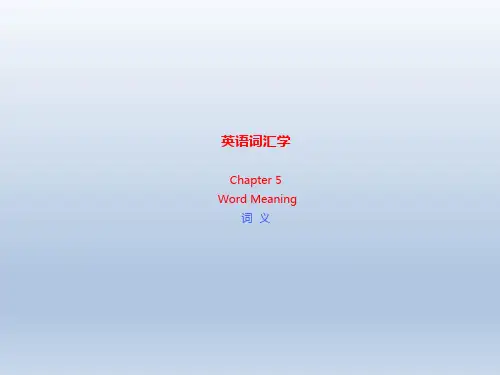
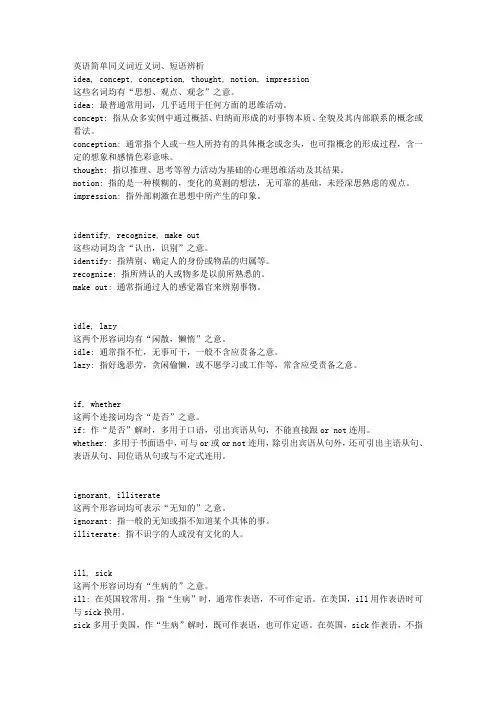
英语简单同义词近义词、短语辨析idea, concept, conception, thought, notion, impression这些名词均有“思想、观点、观念”之意。
idea: 最普通常用词,几乎适用于任何方面的思维活动。
concept: 指从众多实例中通过概括、归纳而形成的对事物本质、全貌及其内部联系的概念或看法。
conception: 通常指个人或一些人所持有的具体概念或念头,也可指概念的形成过程,含一定的想象和感情色彩意味。
thought: 指以推理、思考等智力活动为基础的心理思维活动及其结果。
notion: 指的是一种模糊的,变化的莫测的想法,无可靠的基础,未经深思熟虑的观点。
impression: 指外部刺激在思想中所产生的印象。
identify, recognize, make out这些动词均含“认出,识别”之意。
identify: 指辨别、确定人的身份或物品的归属等。
recognize: 指所辨认的人或物多是以前所熟悉的。
make out: 通常指通过人的感觉器官来辨别事物。
idle, lazy这两个形容词均有“闲散,懒惰”之意。
idle: 通常指不忙,无事可干,一般不含应责备之意。
lazy: 指好逸恶劳,贪闲偷懒,或不愿学习或工作等,常含应受责备之意。
if, whether这两个连接词均含“是否”之意。
if: 作“是否”解时,多用于口语,引出宾语从句,不能直接跟or not连用。
whether: 多用于书面语中,可与or或or not连用,除引出宾语从句外,还可引出主语从句、表语从句、同位语从句或与不定式连用。
ignorant, illiterate这两个形容词均可表示“无知的”之意。
ignorant: 指一般的无知或指不知道某个具体的事。
illiterate: 指不识字的人或没有文化的人。
ill, sick这两个形容词均有“生病的”之意。
ill: 在英国较常用,指“生病”时,通常作表语,不可作定语。
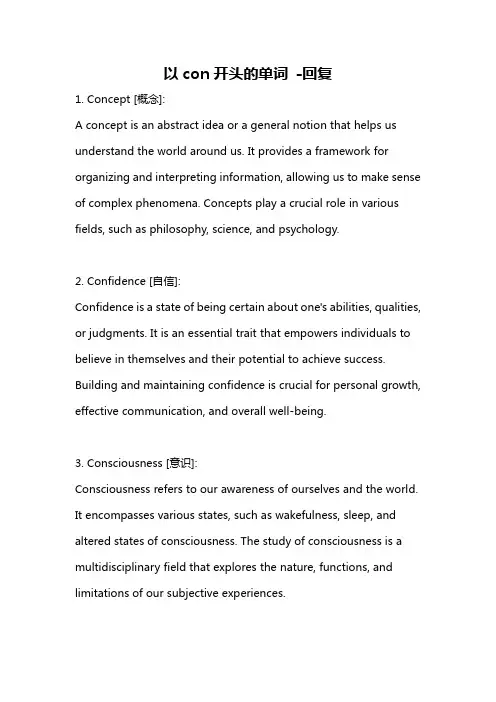
以con开头的单词-回复1. Concept [概念]:A concept is an abstract idea or a general notion that helps us understand the world around us. It provides a framework for organizing and interpreting information, allowing us to make sense of complex phenomena. Concepts play a crucial role in various fields, such as philosophy, science, and psychology.2. Confidence [自信]:Confidence is a state of being certain about one's abilities, qualities, or judgments. It is an essential trait that empowers individuals to believe in themselves and their potential to achieve success. Building and maintaining confidence is crucial for personal growth, effective communication, and overall well-being.3. Consciousness [意识]:Consciousness refers to our awareness of ourselves and the world. It encompasses various states, such as wakefulness, sleep, and altered states of consciousness. The study of consciousness is a multidisciplinary field that explores the nature, functions, and limitations of our subjective experiences.4. Conflict [冲突]:Conflict arises when there is a clash or disagreement between individuals, groups, or entities. It can occur due to differences in values, interests, or goals. Conflict can be both destructive and constructive, depending on how it is managed and resolved. Effective conflict resolution techniques promote understanding, collaboration, and growth.5. Connection [连接]:Connection refers to the establishment of a link or bond between individuals, ideas, or entities. It is essential for building relationships, fostering empathy, and creating a sense of belonging. Strong connections promote personal and professional growth, improve mental well-being, and contribute to a harmonious society.6. Context [背景]:Context provides the background or setting in which an event, situation, or statement occurs. It helps us understand the meaning, significance, and implications of information. Considering context is crucial for effective communication, critical thinking, and problem-solving. Being aware of the context allows us to interpretand respond appropriately to various situations.7. Creativity [创造力]:Creativity is the ability to generate new ideas, concepts, or solutions that are original and useful. It involves thinking outside the box, making connections between seemingly unrelated elements, and embracing uncertainty and ambiguity. Cultivating creativity is essential for innovation, problem-solving, and personal growth.8. Conformity [从众]:Conformity refers to the tendency to adjust one's attitudes, beliefs, or behaviors to align with group norms or societal expectations. It can be both positive and negative, depending on the context. Rational conformity allows for social cohesion and cooperative behavior, while mindless conformity can stifle individuality and critical thinking.9. Communication [沟通]:Communication is the process of sending and receiving messages between individuals or groups. It involves various forms, such as verbal, nonverbal, and written communication. Effectivecommunication skills are essential for building relationships, expressing ideas, resolving conflicts, and fostering understanding.10. Change [变化]:Change refers to the process of transformation or transition from one state to another. It can be gradual or sudden, planned or unplanned. Change is a constant in life, and embracing it is crucial for personal and professional growth. Adapting to change requires resilience, flexibility, and a positive mindset.In conclusion, concepts have a significant impact on how we understand and navigate the world. From confidence to change, these concepts shape our thoughts, behaviors, and interactions. Understanding and applying these concepts can enhance ourself-awareness, relationships, and problem-solving abilities, ultimately leading to personal growth and a more harmonious society.。
心理學名詞釋義【註】教育心理學中的專用術語,請自行查閱→張春興(1989)。
張氏心理學辭典。
臺北:東華書局。
Classical Conditioning:古典制約、古典制約作用、古典制約學習(1)本詞譯為「古典制約」時,係指俄國生理學家巴夫洛夫(I.P. Pavlov)為研究狗的消化,觀察其唾液分泌與相關因素變化的關係時,所特別設計的一種實驗方法與程序。
巴夫洛夫實驗方法中的程序是:選定AB兩種刺激,A刺激(食物)原即引起個體反應(唾液分泌),B刺激(鈴聲)則否(有聽覺反應,但無唾液分泌)。
若使B刺激與A刺激相隨或相伴出現,多次之後,B刺激也能單獨引發A刺激所引起的反應(鈴聲也能單獨引起唾液分泌)。
在此實驗歷程中,實驗者稱A為非制約刺激(unconditioned stimulus, UCS),B刺激稱為制約刺激(conditioned stimulus, CS),由A刺激原來所引起的反應,稱為非制約反應(unconditioned response, UCR),AB兩種刺激伴隨出現之後,B刺激取代A刺激所引起的反應,稱為制約反應(conditioned response, CR)。
按「制約」一詞的涵義,謂某現象發生之先決條件,古典制約中制約刺激之所以能取代非制約刺激功能者,其先決條件在於兩刺激相隨或相伴出現。
古典制約又稱第一型制約(Type I conditioning)。
古典制約因係由巴夫洛夫首創,故而又稱為巴夫洛夫制約法(Pavlovian conditioning)。
(2)本詞譯為「古典制約學習」時,係指一類學習;凡是經由巴夫洛夫制約歷程,使兩種刺激相隨或相伴出現,終而產生刺激代替現象,形成新的刺激反應聯結者,不管在性質上屬於何種刺激(是語文的或符號的),均稱為古典制約學習。
換言之,凡是經由古典制約過程(無論是被安排的或是自然形成的)產生之前所未曾有的刺激與反應間的新聯結,均稱為古典制約學習。
2019考研英语单词巧记:记住这些高频词根(2)词根:cap, cep, ceiv, ceip, cip = cup 拿,抓,握住1. capacity助记:cap(拿)+ acity(表状态,情况)→能拿住→(有)水平释义:n. 容量,容积;接受力;能量,水平举例:(1) Our new hall has a seating capacity of 1,000.我们的新礼堂能够容纳1,000人就座。
(2) The test is used to measure a child’s capacity for learning.这种测试用于衡量儿童的学习水平。
2. capture助记:capt(抓)+ ure(表行为)→抓住→捕获释义:v. 俘虏,捕获,占领;引起注意,吸引住举例:(1) He was captured during the war and put in a Vietnamese prison camp.战争期间他被捕了,被送进了越南的一个监狱营。
(2) The leading actor on the stage captured our attention.舞台上的主角吸引了我们的注意力。
3. concept助记:con(一起)+ cept(抓,引申为接受)→大家都接受的东西→理念释义:n. 理念,观点,概念举例:She added that the concept of arranged marriages is misunderstood in the west.她补充说包办婚姻的概念在西方被误解了。
4. deceive助记:de(变坏)+ ceive(拿,抓)→用不好的手段拿→欺骗释义:v. 欺骗,蒙蔽举例:I do not wish to deceive the young girl who loves me.我不想欺骗这个爱我的年轻女孩。
5. perceive助记:per(全部)+ ceive(拿,抓)→全部拿住→察觉,感知释义:v. 察觉,感知;理解,领悟举例:(1) I perceived a slight sour taste in the wine.我觉得酒里有股淡淡的酸味儿。
conception翻译基本解释●conception:概念,构思,怀孕●音标:[kənˈsepʃən]●词性:o n. 概念,观念,构思o n. 怀孕变化形式●复数形式:conceptions具体用法●●n. 概念,观念,构思:o意思:指某种想法或计划的形成,或对某事物的理解。
o同义词:idea, notion, perception, understanding, thoughto反义词:misconception, misunderstanding, ignorance, confusion, misinterpretationo例句:●The conception of the new project took several months, butit was worth the effort as it turned out to be a great success.(新项目的构思花了几个月的时间,但这是值得的,因为它最终取得了巨大的成功。
)●Her conception of freedom is different from what mostpeople think, as she believes it involves responsibility and discipline. (她对自由的概念与大多数人的想法不同,因为她认为自由涉及责任和纪律。
)●The artist's conception of the future city was both futuristicand realistic, capturing the imagination of everyone who saw it. (艺术家对未来城市的构思既充满未来感又现实,吸引了所有看到它的人的想象力。
)●His conception of justice is rooted in fairness and equality,which he believes are essential for a harmonious society. (他对正义的概念植根于公平和平等,他认为这是和谐社会的必要条件。
描写生活观念的词语概念[gàiniàn]生词本基本释义详尽释义在头脑里所形成的反映对象的本质属性的思维形式。
把所感知的事物的共同本质特点抽象出来,加以概括,就成为概念,概念都具内涵和外延,并且随着主观、客观世界的发展而变化百科释义概念(idea;notion;concept)人类在认识过程中,从感性认识上升到理性认识,把所感知的事物的共同本质特点抽象出来,加以概括,是本我认知意识的一种表达,形成概念式思维惯性。
在人类所认知的思维体系中最基本的构筑单位。
概念可以大众公认的,也可以是个人认知特有的一部分。
表达概念的语言形式是词或词组。
概念都有内涵和外延,即其涵义和适用范围。
概念随着社会历史和人类认识的发展而变化。
中华人民共和国国家标准gb/t15237.1-2000:“概念”是对特征的独特组合而形成的知识单元。
德国工业标准2342将概念定义为一个“通过使用抽象化的方式从一群事物中提取出来的反映其共同特性的思维单位”描绘日常生活的不好词幸福美满和谐和睦富裕富足充裕团圆团圆宽慰亲密高兴开心满足用户恩爱原谅温馨温暖平易近人和蔼可亲亲热爱护协助分摊祝福调皮开朗温柔祈祷高兴甜蜜和美尊敬理解客套谅解融洽亲情呵护谦让温馨尊重分享慈祥亲切操劳体谅夸奖沟通舒适喜悦喜讯团聚和解慰藉贺喜陶醉欢聚撒娇欣然温馨人与自然和睦相处天伦之乐其乐融融各得怡然自乐互敬互爱彬彬有礼应有尽有富裕一应俱全夫妻恩爱合家欢乐尊老爱幼同气举案齐眉体贴入微红红火火甜甜蜜蜜和和欢声笑语心情舒畅蒸蒸日上丰衣足食和颜吃苦耐劳尊老爱幼温馨舒适敬老尊贤辛勤喜笑颜开井井有条喜上眉梢一心一意满面心意相通同甘共苦幸福和睦关怀体贴丰盛勤俭持家精神饱满心平气和悲欢离合美好【必也正名】:指必须按照正统伦理观念和礼仪关系来端正纲纪名分。
【良知良能】:旧有指人的天赋的新宠观念和本能。
【穷奢极欲】:穷:极;奢:奢侈;欲:享乐的观念。
奢侈和贪欲到了极点。
【却客疏士】:却:婉拒;奏:疏离;客:外来人;士:读书人。
ConceptA. From WikipediaA concept is an abstraction or generalisation from experience or the result of a transformation of existing ideas.The concept is instantiated (reified) by all of its actual or potential instances, whether these are things in the real world or other ideas. Concepts are treated in many if not most disciplines both explicitly, such asin linguistics, psychology, philosophy, etc., and implicitly, such asin mathematics, physics, etc. In informal use the word concept often just meansany idea, but formally it involves the abstraction component.When the mind makes a generalization such as the concept of tree, it extractssimilarities from numerous examples; the simplification enables higher-levelthinking.In metaphysics, and especially ontology, a concept is a fundamental category of existence. In contemporary philosophy, there are at least three prevailing ways to understand what a concept is:∙Concepts as mental representations, where concepts are entities that exist in the brain (mental objects)∙Concepts as abilities, where concepts are abilities peculiar to cognitive agents (mental states)∙Concepts as Fregean senses (see sense and reference), where concepts are abstract objects, as opposed to mental objects and mental statesEmbodied contentMain article: Embodied cognitionIn cognitive linguistics, abstract concepts are transformations of concrete concepts derived from embodied experience. The mechanism of transformation is is structural mapping, in which properties of two or more source domains are selectively mapped onto a blended space (Fauconnier & Turner, 1995;see conceptual blending). A common class of blends are metaphors.Abstract objectsMain article: Abstract objectIn a platonist theory of mind, concepts are construed as abstract objects. This debate concerns the ontological status of concepts – what they are really like.In the simplest terms, a concept is a name or label that regards or treats an abstraction as if it had concrete or material existence. I t is important to realizethat a concept is merely a symbol, a representation of the abstraction. The word is not to be mistaken for the thing. For example, the word "moon" (a concept) is not the large, bright, shape-changing object up in the sky, but only represents that celestial object. Concepts are created (named) to describe, explain and capture reality as it is known and understood.Issues in concept theoryA priori conceptsMain articles: A priori and a posteriori and Category (Kant)Kant declared that human minds possess pure or a priori concepts. Instead of being abstracted from individual perceptions, like empirical concepts, they originate in the mind itself. He called these concepts categories, in the sense of the word that means predicate, attribute, characteristic, or quality. But these pure categories are predicates of things in general, not of a particular thing. He called those concepts that result from abstraction "a posteriori concepts" (meaning concepts that arise out of experience). An empirical or an a posteriori concept is a general representation (Vorstellung) or non-specific thought of that which is common to several specific perceived objects (Logic, I, 1., §1, Note 1)A concept is a common feature or characteristic. Kant investigated the way that empirical a posteriori concepts are created.The logical acts of the understanding by which concepts are generatedas to their form are:parison, i.e., the likening of mental images to one another inrelation to the unity of consciousness;2.reflection, i.e., the going back over different mental images, howthey can be comprehended in one consciousness; and finally3.abstraction or the segregation of everything else by which themental images differ ...In order to make our mental images into concepts, onemust thus be able to compare, reflect, and abstract, forthese three logical operations of the understanding areessential and general conditions of generating anyconcept whatever.OntologyMain article: OntologyPlato was the starkest proponent of the realist thesis of universal concepts. By his view, concepts (and ideas in general) are innate ideas that were instantiations of a transcendental world of pure forms that lay behind the veil of the physical world. In this way, universals were explained as transcendent objects.Main article: Mental representationIn a physicalist theory of mind, a concept is a mental representation, which the brain uses to denote a class of things in the world. This is to say that it is literally, a symbol or group of symbols together made from the physical material of thebrain.Concepts are mental representations that allow us to draw appropriate inferences about the type of entities we encounter in our everyday lives.Concepts do not encompass all mental representations, but are merely a subset of them.The use of concepts is necessary to cognitive processes suchas categorization, memory, decision making, learning, and inference.Notable theories on the structure of conceptsClassical theoryMain article: DefinitionismThe classical theory of concepts, also referred to as the empiricist theory of concepts,is the oldest theory about the structure of concepts (it can be traced back to Aristotle), and was prominently held until the 1970s.The classical theory of concepts says that concepts have a definitional structure.Adequate definitions of the kind required by this theory usually take the form of a list of features. These features must have two important qualities to provide a comprehensive definition.Features entailed by the definition of a concept must be both necessary and sufficient for membership in the class of things covered by a particular concept. A feature is considered necessary if every member of the denoted class has that feature. A feature is considered sufficient if something has all the parts required by the definition.Another key part of this theory is that it obeys the law of the excluded middle, which means that there are no partial members of a class, you are either in or out.Prototype theoryMain article: Prototype theoryPrototype theory says that concepts specify properties that members of a class tend to possess, rather than must possess.Wittgenstein describes the relationship between members of a class as family resemblances. There are not necessarily any necessary conditions for membership, a dog can still be a dog with only threelegs.This view is particularly supported by psychological experimental evidence for prototypicality effects.We can judge an item's membership to the referent class of a concept by comparing it to the typical member – the most central member of the concept. If it is similar enough in the relevant ways, it will be cognitively admitted as a member of the relevant class of entities.Rosch suggests that every category is represented by a central exemplar which embodies all or the maximum possible number of features of a given category.Theory-theoryThis theory postulates that categorization by concepts is something like scientific theorizing.Concepts are not learned in isolation, but rather are learned as a part of ourexperiences with the world around us.In this sense, concepts' structure relies on their relationships to other concepts as mandated by a particular mental theory about the state of the world.Ideasthesia[edit]According to the theory of ideasthesia (or "sensing concepts"), activation of a concept may be the main mechanism responsible for creation of phenomenal experiences. Therefore, understanding how the brain processes concepts may be central to solving the mystery of how conscious experiences (or qualia) emerge within a physical system e.g., the sourness of the sour taste of lemon. This question is also known as the hard problem of consciousness.Research on ideasthesia emerged from research on synesthesia where it was noted that a synesthetic experience requires first an activation of a concept of the ter research expanded these results into everyday perception.B. From Sci-tech encyclopediaConcept1. International Dictionary of Psychoanalysis | 2005 | Luzes, PedroCOPYRIGHT 2005 Thomson Gale.For Wilfred Bion, conception is the result of coupling a pre-conception, an innate a priori idea, and a realization, elements of the real that are provided by external-sensory or internal-emotional experience. The concept is derived from conception through abstraction and generalization. Language and the attribution of a name to a concept unite preconception and realization, preventing any loss of experience in the process.Bion considers the concept a conception that has been assigned a name. The concept signifies a growth of the abstraction that enables us to expand the generalization of psychoanalytic theories, which, as a whole are judged to be too descriptive, too concrete. Concepts can be articulated in a deductive scientific system that functions like an Ars combinatoria2. The Oxford Pocket Dictionary of Current English | 2009© The Oxford Pocket Dictionary of Current English 2009, originally published by Oxford University Press 2009.con·cept / ˈkänˌsept/• n. an abstract idea; a general notion: the concept of justice.∎ a plan or intention; a conception: the center has kept firmly to its originalconcept. ∎ an idea or invention to help sell or publicize a commodity: a new concept in corporate hospitality.∎ Philos. an idea or mental picture of a group or class of objects formed by combining all their aspects. ∎ [as adj.] (of a car or other vehicle) produced as an experimental model to test the viability of new design features.C. British Dictionary definitions for conceptnoun1.an idea, esp an abstract idea: the concepts of biology2.(philosophy) a general idea or notion that corresponds to some class of entities andthat consists of the characteristic or essential features of the class3.(philosophy)a.the conjunction of all the characteristic features of somethingb. a theoretical construct within some theoryc. a directly intuited object of thoughtd.the meaning of a predicate4.(modifier) (of a product, esp a car) created as an exercise to demonstrate thetechnical skills and imagination of the designers, and not intended for massproduction or saleWord Origin and History for conceptn.1550s, from Medieval Latin conceptum "draft, abstract," in classical Latin "(a thing) conceived," from concep-, past participle stem of concipere "to take in"(see conceive). In some 16c. cases a refashioning of conceit (perhaps to avoidnegative connotations).D. From Britannica encylopedia1. concept, in the Analytic school of philosophy, the subject matter of philosophy,which philosophers of the Analytic school hold to be concerned with the salientfeatures of the language in which people speak of concepts at issue. Concepts are thus logical, not mental, entities. A typical instance of the use of concept is in The Concept of Mind(1949) by Gilbert Ryle, an Oxford Analyst, which implies that the purpose of the author is not to investigate matters of fact empirically (i.e., by the methods of psychology) about the mind itself but to investigate its “logicalgeography.” Similarly, investigation ... (100 of 138 words)2. concept formation, process by which a person learns to sort specific experiences into general rules or classes. With regard to action, a person picks up a particular stone or drives a specific car. With regard to thought, however, a person appears to deal with classes. For instance, one knows that stones (in general) sink and automobiles (as a class) are powered by engines. In other words, these things are considered in a general sense beyond any particular stone or automobile. Awareness of such classes can help guide behaviour in new situations.E. From Philosophy dictionaryconceptDictionary of Kants Technical TermsDictionary of Philosophy of MindF. From Collins English Dictionarynoun1. an idea, esp an abstract idea ⇒the concepts of biology2. philosophy a general idea or notion that corresponds to some class of entities and that consists of the characteristic oressential features of the class3. philosophy a. the conjunction of all the characteristic features of somethingb. a theoretical construct within some theoryc. a directly intuited object of thoughtd. the meaning of a predicate4. (modifier) (of a product, esp a car) created as an exercise to demonstrate the technical skills and imagination of thedesigners, and not intended for mass production or sale.。